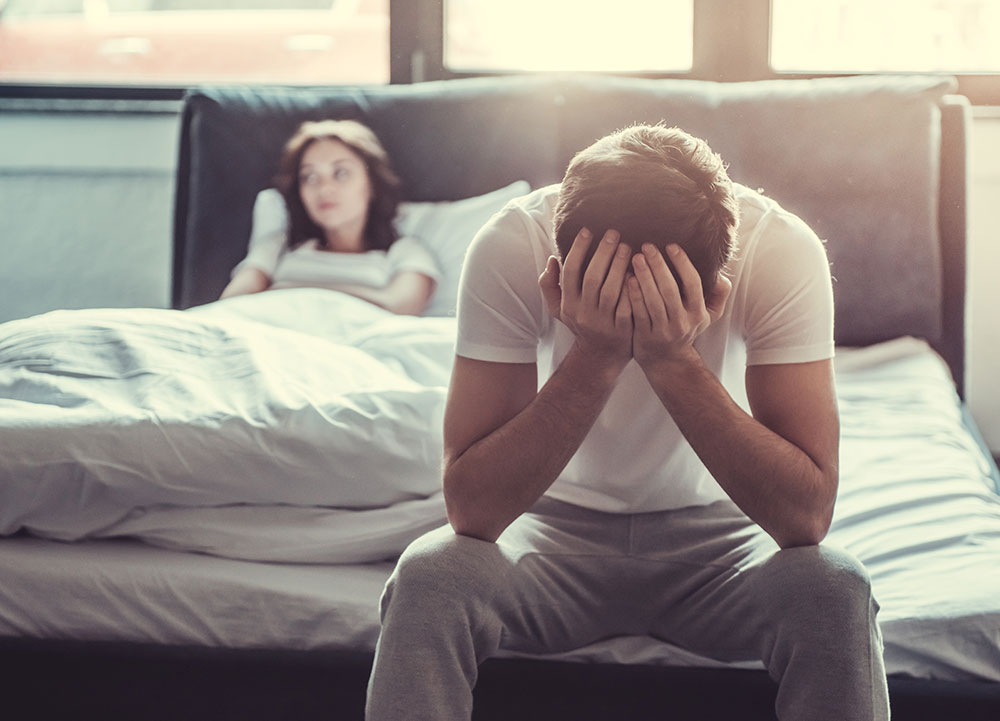Your Life Without Quality Sleep
If you struggle with sleep deprivation, it can have a serious impact on your daily life and activities. Not only does sleep deprivation lower your concentration and productivity, but it also puts you at higher risk for accidents. Suffering from sleep apnea can be an everyday battle that can significantly impact your overall well-being.
Sleep apnea is a common disorder that causes you to frequently wake up throughout the night due to a blockage in the airway. The interruption in your breathing prompts your brain to signal you to wake up, causing multiples disturbances to your sleep during the night.
Most people need about seven to nine hours of sleep on average each night to function at their full potential. Lack of sleep can cause fatigue, irritability, and a variety of other consequences for your overall health.

Sleep Apnea’s Impact On Your Mental Health

Sleep apnea causes the airway to be blocked during sleep, resulting in snoring and pauses in your breathing. When you stop breathing, your brain will trigger your body to wake up and resume normal breathing. Oftentimes, people with sleep apnea don’t remember waking up during the night.
With sleep apnea, your REM sleep cycle endures repeated interferences, causing a chemical imbalance in your brain. This imbalance can trigger a range of emotions and sometimes lead to mental health issues.
When your brain undergoes an imbalance of chemicals, you become more irritable and can have difficulty processing your emotions. Many factors contribute to mental health disorders, but those with sleep apnea may face a higher risk of developing depression and anxiety.
Fortunately, sleep apnea treatment can help those who suffer from this sleep disorder and any related mental health effects.
Sleep Apnea & PTSD
Post-traumatic stress disorder is no longer a hush-hush topic, as military personnel continue to return from combat situations having to reintegrate into society. Shallowness of breath, waking up with nightmares from past stressful situations, and feeling as though they are always on guard are all factors that contribute to sleep apnea.
Everything about PTSD is indicative of sleep apnea as well. Men and women who are in severe, stressful situations tend to fall into sleep apnea patterning. Being jarred out of sleep at night due to lack of air, gasping for air at night, concentration or memory problems, headaches in the morning, and feeling tired and fatigued all day are the main symptoms of PTSD-induced sleep apnea.

Managing Your Sleep Apnea & PTSD

There are a few helpful tips that can be utilized to help you better manage your PTSD and sleep apnea, such as:
- Setting Up a Routine Schedule – Sticking to a regular exercise and sleeping schedule can help your sleep apnea in a big way. It’s wise to not engage in strenuous exercise at least six hours before bedtime. Get in the habit of going to bed and waking up around the same time every night and morning.
- Monitor Your Eating & Drinking Habits – It’s helpful to document what you eat and at what time. Heavy fats or sugar before bedtime will disrupt your sleep, as your metabolism will be too busy digesting and unable to allow your body to rest. Avoid alcohol if possible, as it can aggravate the effects of sleep apnea and make sleeping difficult.
- Adopting Healthy Sleep Protocols – Try to avoid or limit naps during the day, especially after 3 p.m. If you try to force yourself to sleep when you’re not tired, it won’t work. If you find yourself waking up during the night, try reading a book or drinking chamomile tea, as this can help your body return to a peaceful state.
- Relaxation – Make your bedroom surroundings as tranquil as possible. Soft lighting before bedtime, turning off all electronics, and engaging in some mindful breathwork will all contribute to a better night’s rest.
Frequently Asked Questions
What if I don’t seek treatment for sleep apnea?
Sleep apnea likely won’t go away on its own unless treated by an experienced expert like Dr. Winkelmann. If left untreated, sleep apnea can severely impact your overall mental wellness, with the consequences being potentially life-threatening. Studies have connected sleep apnea to a higher risk of conditions such as anxiety, depression, hypertension, and more.
How can sleep apnea treatment improve my mental health?
Constant interruptions with your REM cycle can cause a chemical imbalance in your brain, causing irritability and difficulty in processing emotions. If left untreated, this can also contribute to developing depression and anxiety. Fortunately, sleep apnea treatment is designed to boost your mental health by giving your brain the quality rest it needs during the night.
Can stress make my sleep apnea symptoms worse?
Stressful situations and stress related disorders like PTSD can cause a person to fall into sleep apnea patterns. Additionally, repeatedly being jarred out of sleep because you’re gasping for air can further complicate already-existing issues including struggles with memory, morning headaches, feeling fatigue, and concentration. If you struggle with persistent nightmares, stress, or other mental health issues, it’s important to get treatment for your sleep apnea.
Can I reduce my sleep apnea symptoms?
There are certain lifestyle changes that you can adopt along with treatment to reduce the frequency and intensity of your sleep apnea symptoms. Your sleep dentist will recommend that you exercise regularly as well as monitor your food and drink intake. It’s also important to try to avoid napping during the day and practicing relaxation techniques before going to bed.
Contact Dr. Winkelmann For Sleep Solutions
Dr. Winkelmann offers a variety of specialized treatments to fit your lifestyle and needs. If you feel the symptoms you’re experiencing may be linked to sleep apnea, call our Wake Forest office at (984) 237-1013 and schedule a consultation with Dr. Winkelmann. Once you’ve undergone a sleep study and received a proper diagnosis, he’ll work with you to develop a customized treatment plan that fits your specific needs.
